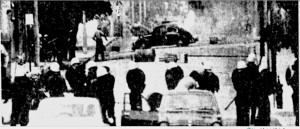History: Ramsbotham’s Initial Riot Report
 Former Governor Sir Peter Ramsbotham said actions by a handful of “PLP militants” helped to provoke the December, 1977 riots which left three people dead and caused millions of dollars in property damage.
Former Governor Sir Peter Ramsbotham said actions by a handful of “PLP militants” helped to provoke the December, 1977 riots which left three people dead and caused millions of dollars in property damage.
Sir Peter, in a now declassified report sent to London’s Foreign & Commonwealth Office in the immediate aftermath of the worst civil disturbances in Bermuda’s history, said agitators “set the stage” for rioting which broke out when convicted murderers Erskine (Buck) Burrows and Larry Tacklyn were executed in December, 1977.
The former British ambassador to Washington who had taken up his Bermuda post just a few months earlier said the “militants” deliberately undermined the PLP leadership’s call for peaceful and lawful opposition to the hangings.
“It was announced on Friday, 25 November, that both men would, in consequence, be executed a week later,” said Sir Peter. “For a time, the PLP remained silent: although the House of Assembly met on the day of the announcement, the subject was never mentioned during its meeting. But the group of PLP militants took swift and energetic action.
“Over the weekend, they pressured the party’s leaders and some members of the Ministerial Association of the Churches here into sponsoring a protest campaign; they arranged to feed slanted information to left-wing Members of Parliament in the UK and to the press there; they lobbied international bodies opposed to capital punishment, and they formed a local body to oppose it.
“They thus set the stage for a week of inflammatory activity, throughout which they were themselves never averse to inciting racial hatred – and, I suspect, always hopeful of provoking the riots which eventually erupted.
“There is no evidence that either the Leader of the Opposition (Dame Lois Browne Evans) or any of her Parliamentary colleagues shared such a hope. Quite the contrary: they blocked several of the , more extreme proposals of the militants, insisting, privately as well as publicly, that all demonstrations must remain peaceful and that nothing unlawful was to be attempted.”
Submitted to London in February, 1978, Sir Peter later substantially revised some of the initial opinions he expressed in this report about Bermuda’s socio-economic and political conditions in the wake of the Pitt Commission hearings held that summer into the circumstances which gave rise to the rioting.
“We followed that (the Pitt Report) up by having a constitutional conference with a body from the Foreign Office and ourselves, and both parties were there, and we changed … what had been the vexatious point, constitutionally, which was called the Commonwealth vote,” said Sir Peter in a 2001 interview. “Young white people, who’d been in Bermuda for more than three years, had the vote at the elections just because they were Commonwealth and white. This had virtually deprived the black Opposition party of ever really getting enough votes to get power.
“For 30 years, you’d had a one-party dictatorship there. So we eliminated the Commonwealth vote over a period of time. By doing so we reduced racial tension. Now the black Opposition have become the Government. Whether they will control the racial problems, I cannot tell. But that was the peace.”
Sir Peter died in the United Kingdom last year at the age of 90.
The 12-page report from February, 1978 appears below:

